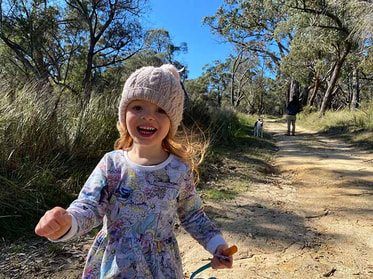 When I grow up will the world be a better place? I hope so,
When I grow up will the world be a better place? I hope so, for it’s in your hands! Photo: Sally McNiece.
THE Australian Earth Laws Alliance (AELA) has tackled the issue of climate change head on through its webinar series Earth Laws Month September 2022.
ALEA’s mission is to increase the understanding and practical implementation of Earth-centred governance, with a focus on law, economics, education, ethics and the arts. The seminars, spread across the month, dealt with 35 topics and gave its 65 international and home-based scholarly speakers the chance to analyse the subject and chart a way forward.
Perhaps “way forward” is the key phrase. From the Andes Mountains to the shores of Western Port, the pressures that governments are putting on communities and the natural environment in the quest to satisfy the economic bottom line are taking a toll. It’s time the people set the ground rules.
In one of the last seminars, Professor Brendan Mackey indicated that, while there is a place for government planning and support to deal with environmental problems, the time has come for the community to take collective action by implementing “community-based strategic resilience and adaption planning” to deal with the environmental ills we now face, both locally and internationally.
Guided by Dr Michelle Maloney, co-founder and national convenor of AELA, the “way forward” was addressed in the seminars covering these themes:
- Earth laws and governance
- First Nations peoples, Caring for Country
- Economics for the Earth
- Arts and creativity
- Sciences: social, life and earth
- Earth education
- Greenprints program
- Earth ethics
- Australian Peoples’ Tribunal for Community and Nature’s Rights.
The series did not rely on any one keynote speaker to highlight the need to address the environmental issues confronting communities across the world. Rather, each delegate contributed to the conversation thus underlining the fact that we all have a part to play. As Professor Ian Lowe said, “There is no possibility of achieving our stated goal of sustainable development if we don’t stabilise the human population and reduce our resource demands.”
The speakers generally took a positive approach on how to deal with climate change issues. However, there was an underling message: if we are to achieve social equity and ecological sustainability and protect the rights of nature, governments and others advocating continual economic growth must now rethink and reset their priorities.
This message was reiterated by Osprey Orielle Lake, founder and executive director of the Women’s Earth and Climate Action Network, and mirrored some of what she had said in an address to a United Nations Climate Conference. "As we head into COP26, please know we are not willing to die or sacrifice future generations for truly pitiful reasons of greed, political power and hubris. Rather we are willing to fight to use our imaginations, innovations, to be alive, to thrive, to be courageous, to be uncomfortable for positive changes, to be bold, and to win. We are willing to endlessly fight for policies that prioritise social, racial and economic justice, and Indigenous and human rights.”
Another inequity the seminar explored was that across the world, people are spending an inordinate amount of time challenging unwanted development in their communities. Even if they achieve a court decision in their favour, governments can change the planning laws. This negates the people’s wishes and exposes the natural environment to ongoing vandalism and dubious restoration programs.
Is it possible to change this situation?
Quite possibly, for AELA has launched a citizens’ inquiry into Australia’s planning laws as part of its Earth Laws and Governance theme. They are inviting testimonies from people around Australia about how planning laws are working (and not working) for them and their communities, and how we can transform our planning system to truly support local communities and the living world.
You can take part at the Australian Peoples’ Tribunal for Community and Nature’s Rights.
Waiting in the wings are two further crucial issues: sand mining in the Western Port Woodlands and the urgent need for a strategic framework for Western Port Bay.
As said in my previous Post articles, Western Port belongs to all Victorians. I encourage all to ask the candidates lining up to occupy the plush parliamentary seats at Spring Street what they are prepared to do to ensure these issues are addressed. Working in Spring Street is one thing; meeting the needs of the community is another.
The AELA seminars highlighted that across the world, politicians and powerful lobby groups hold sway – now is the time to change the balance of power.